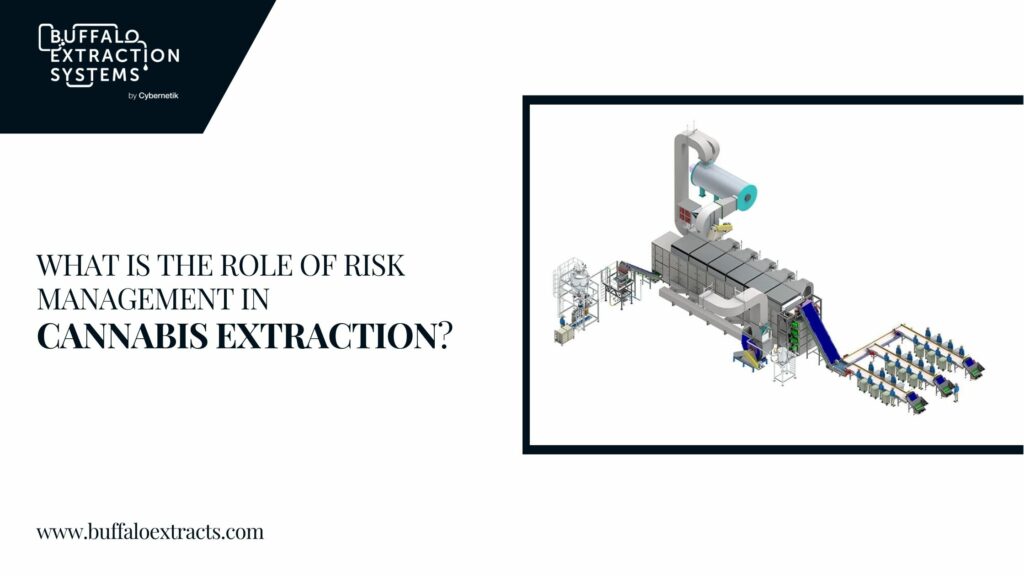The Essential Role of Risk Management in Cannabis Extraction
Rapid evolutions in the cannabis industry have triggered innovationsin extraction tools and techniques. The process is essential for producing high-quality concentrates, essential oils, and edibles that are in high demand. However, as the industry grows, so does the complexity of managing the associated risks.
Effective risk management is more than just another regulatory requirement to adhere to, it is the cornerstone of a sustainable and profitable operation. Let us explore the crucial role of risk management in medical Cannabis extraction, providing insights into the challenges and strategies that ensure the safety and quality of products.
Understanding the Risks
Cannabis extraction includes separating cannabinoids and terpenes from plant material using various methods, such as Supercritical Fluid Extraction (SCFE) that generally uses supercritical carbon dioxide (sCO2),Cryogenic Ethanol Extraction, or Solvent Extraction. Each method carries its own set of risks, including:
- Chemical Hazards: The solvents used in cannabis extraction processes can be volatile, and create an explosive environment if not handled with care. Proper storage, handling, and disposal of these chemicals are crucial to prevent accidents. Additionally, workers need to be trained in emergency procedures should a chemical incident occur.
- Equipment Failure: The high-pressure systems used in certain extraction methods, SCFE for example, are complex and require regular maintenance to function safely. Failures can lead to leaks or bursts, posing serious risks to workers and facilities. Implementing a preventive maintenance schedule is key to avoiding such failures.
- Regulatory Compliance: Cannabis businesses must navigate through several laws that guide everything from production to packaging. Staying compliant involves keeping abreast of changes in legalization and ensuring all aspects of the operations meet the relevant legal standards.
- Product Contamination: The purity of cannabis extracts is critical for consumer safety. Contamination can occur at various stages of the extraction process, from the raw material to the final product. Strict quality control measures and batch testing are essential to prevent contaminants.
Implementing Risk Management Strategies
Effective risk management is essential for mitigating these risks. Key strategies include:
- Standard Operating Procedures (SOPs): In the context of cannabis extraction, SOPs cover every aspect of the process, from the handling and storage of raw materials to the operation of CO2 extraction equipment and the packaging of the final product. They are essential for maintaining quality control, ensuring regulatory compliance, and assuring worker safety.
- Training and Education: Ongoing training programs are crucial for guaranteeing that employees are up-to-date with the latest safety protocols, extraction techniques, and regulatory requirements. This includes not only initial training but also continuous education to adapt to new technologies and regulations. Well-trained staff are less likely to make errors that could lead to accidents or product recalls. Extracts from cannabis are used in the food industry where product recalls are the top profitability killers.
- Equipment Maintenance: Regular maintenance of extraction equipment is necessary to prevent malfunctions that could lead to safety incidents or production downtime. This includes scheduled inspections, cleaning, and repairs, as well as keeping logs of maintenance activities. Proactive maintenance helps extend the lifespan of equipment and confirms that it operates at peak efficiency.
- Compliance Audits: Regular internal and external audits are essential for verifying that a cannabis extraction facility adheres to all relevant laws and regulations. These audits help identify potential areas of non-compliance before they escalate into serious issues, allowing for prompt and directed corrective actions.
- Quality Control: Quality control measures are implemented to ensure that the extracted cannabis products are safe, pure, and potent. This involves testing for contaminants such as pesticides, heavy metals, and residual solvents as well as verifying that the product meets the specified concentration of cannabinoids and terpenes. Rigorous quality control is vital for consumer safety and maintaining the brand’s integrity.
The Benefits of Risk Management
A robust risk management plan offers various benefits such as:
- Safety: In the context of medical cannabis extraction, safety is paramount. The process involves handling volatile substances and operating under high pressure and temperature, which can pose risks of explosions, fires, and exposure to harmful chemicals. Implementing safety protocols such as ventilation, PPE, and emergency protocols protects both employees and customers from these potential hazards.
- Compliance: Adhering to industry regulations is not just about avoiding penalties; it is about establishing that the business operates within the legal framework. This includes compliance with state and federal laws regarding the use of solvents, waste disposal, product labeling, and more. Staying compliant helps maintain the business’s legal standing and allows for uninterrupted operation.
- Efficiency: Efficiency in cannabis extraction means minimizing waste, optimizing processes, and reducing downtime. This involves maintaining Cannabis extraction equipment properly, streamlining workflows, and utilizing resources effectively. An efficient operation can lead to increased productivity and cost savings, which are crucial for staying competitive in the market.
- Reputation: A company’s reputation hinges on the quality and safety of its products. In the cannabis industry, where consumers are particularly concerned about product purity and potency, maintaining high standards is essential. A good reputation leads to customer loyalty and brand strength, which are key-drivers for long-term success.
Finally,
Risk management in cannabis extraction is a dynamic ongoing process that requires attention to detail, a commitment to safety, and a proactive approach to regulatory compliance. As the industry continues to mature, businesses that prioritize risk management will not only thrive but also set the standard for excellence. By investing in comprehensive risk management strategies, cannabis extraction companies can protect their employees, customers, and the environment while positioning themselves for long-term success in a competitive market.

